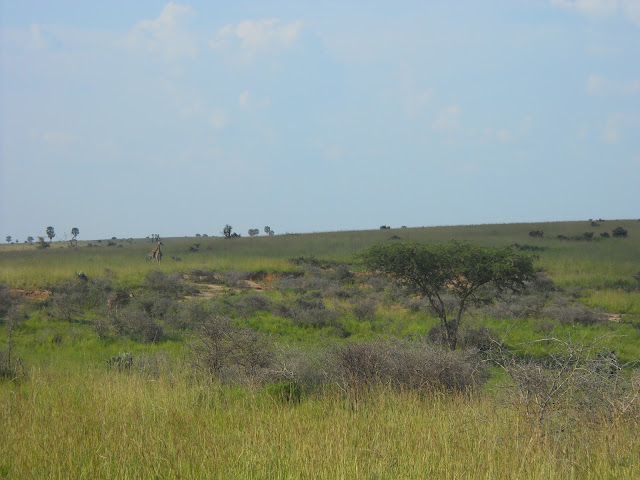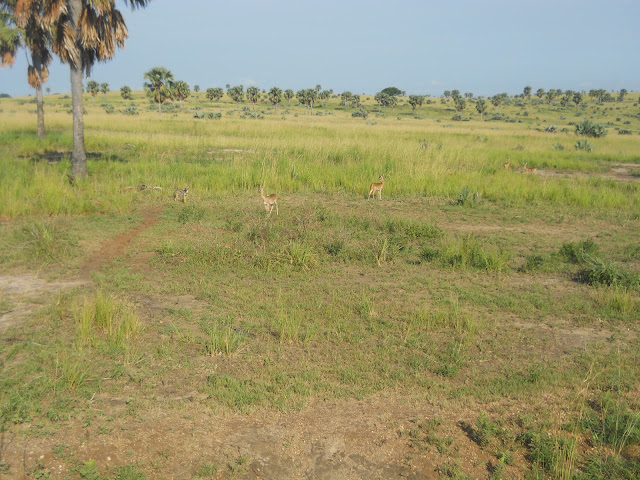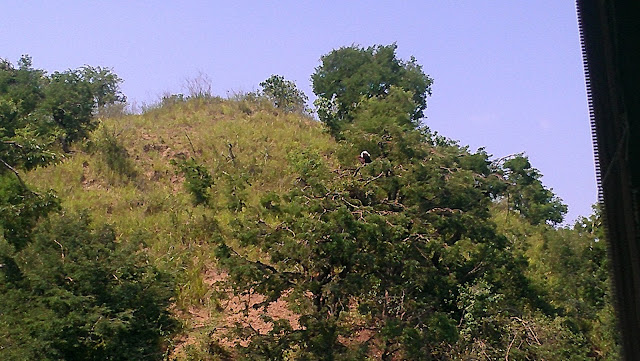A New Ordinary
1.12.15
11.11.15
The Spaces That I Used To Go
Moving is a fraught process no matter what. You decide which
things to keep, give away, sell, or trash. You slowly deconstruct the pieces of
routines which have served you. You begin the process of turning your home back
into a house, just a place where things are stored instead of a space where
memories live.
I have less than a month left in Uganda.
It feels anticlimactic and strange to watch my house
transform into what it was when I came. When I take things off the walls, the
light reflects differently and confuses me for a moment. When I wonder where
something has gone, I remember I’ve packed it away or given it to someone.
I will not be taking most of my belongings with me. In true
American fashion, I’ve managed to acquire an impressive amount of things in two
years, things I thought I needed or wanted that now just take up space. Most of
them will be sold/given to other Volunteers or my neighbors.
I continue to use a lot of things in my house for daily life
but it feels like I’m performing a play, using props that belong to the theatre
instead of me. Life’s a stage, after all.
None of these possessions will be in my life next month.
Even as I’ve tried to get over loving material things (my first journal eaten
by termites, a raincoat lost in a taxi), I still love them. The particular red
of a coffee cup, the bucket I wash my clothes in, my blue teaching sandals. I
have immaterial loves as well, and it’s those I suspect I’ll remember more. The
feel of my bare feet on the cement floor I just mopped, laughing with my
neighbors, the way I can think a million thoughts in a one hour taxi ride so by
the end I’m convinced I’ve solved the universe.
It used to confound me to see Ugandan people traveling long
distances without much luggage. Now I know it confounds them how I need so many
things to stay well. I’m not knocking the simple life or the life filled with
things. Just trying to say that possessions can be important to us, and like
other important things, they can leave our lives and still have been important.
It’s not necessary to hang on to something for it to mean something to you.
No doubt some new tutors will move into my house when I
leave, or perhaps someone higher up in the pecking order will be shifted here
and the tutors will get the other person’s house. No doubt they will own fewer
things than me, decorate the place differently, and definitely clean it better
than I have. But for two years it was my space, the first house I ever lived in
by myself, and it mattered.
Sometimes I have difficulty explaining to Ugandans
why I love my house so much, why I spend a lot of my free time in it and why I
buy a lot of things to fill it. Americans tend to have a sense of pride about
their homes, whether they’re houses or apartments or condos or trailers. We see
the home as an extension of self, an outward display of all the things you care
about, dream for, and work towards. We see it as a place to relax and not put
on a performance for anyone, as a place where you can choose to go and get away
from people and it is completely your space. We see space as a premium, that
even if you don’t have a lot of things, it’s nice to have a lot of space.
I will miss it because it mattered.
15.10.15
Beyond ROY G. BIV
I’m a month late on talking about our Close of Service (COS)
Conference, so sue me.
In early September, my group (Cohort 2 who came to Uganda in
November 2013) got together for the first time since January. The point of COS Conference
is to both prepare you to leave Uganda and prepare you to re-enter American
life.
I think it was one of the most useful conferences I’ve ever
been to. We spoke on improving our resumes, interview techniques, post-service
medical insurance (ACA what am I doing with this?), receiving our Readjustment
Allowance (a Peace Corps severance package), and saying goodbye to our
communities. We talked about coming full circle from not knowing any of each
other two years ago to being extremely close friends now.
I also turned 25 during the conference. Definitely one of my
better birthdays, spent with good friends, eating good food, at a beautiful
hotel.
In some ways it feels like I’ve been in Uganda forever, much
longer than 2 years, and in others it feels like no time at all. I’m planning a
post-PC trip to Western Europe (in PC jargon we call it a COS trip) for most of
December, and landing back in Michigan by Christmas.
I think one of the hardest things about time passing here is
that there are no seasons (in the American sense) to pass the time. When one
month turns into the next, maybe it rains more or maybe it rains less, but
things look the same. Different crops are planted but people dig all the same.
A different school term comes but you teach all the same. Now leaving the
equator to vacation in a cold place and flying home to an even colder one will
I think be a wake-up call for my brain to remember what I grew up in.
Uganda has been the first time I’ve lived alone for an
extended period of time, being responsible for my house and everyday tasks. So
though I didn’t pick my house or my neighborhood per say, and though I don’t
pay taxes or cut the lawn, I feel a sense of ownership. I know it will be hard
to leave.
In my last few months I’m trying to take more videos, so
that even if I can’t upload them while I’m here (woo expensive data packages),
I can make something of them when I get home, and when I get homesick for
Uganda.
Though this blog will be ending, I’ll have a short term blog
while in Europe. And when I get back to the US, look out for a new project
titled “Will They Know Me Back Home?”, documenting my group’s return to the US
and how we’re dealing with readjustment. Many Returned Peace Corps Volunteers
(RPCVs) say that their host country feels like a dream once they return to
America,
because no one has the context to understand your life for the past
two years. At COS we discussed creating our ‘elevator pitches’, a 30 second to
1 minute description of what we’ve been doing. Mainly this was for job
prospects, but we were also encouraged to think of preparing these for
conversations with friends and family. It’s common knowledge that a few people
in your pre-PC life will want to sit and spend an evening with you discussing
everything, but most people in your social circles just want to hear the
highlights.
I’ve had a couple conversations with close friends here that
revolve around the theme, would you do it again? That if you could rewind back
to your acceptance email, knowing everything you know about your Peace Corps
Service, would you come again?
I have to say I don’t know. One of the reasons I told myself
I joined Peace Corps (which may be different from the actual reasons I joined
Peace Corps) was that I wanted to be uncomfortable. I was raised in a culture
where I could control many things in my life, where I had a lot of
opportunities to do what I wanted and live the life I wanted to live. I had
never experienced a culture or a place where that was not necessarily true. And
I know that many in the world, especially many that live in poverty both inside
and outside the US do not know that experience.
I can say for sure that I have experienced being
uncomfortable many times, and for many continuous hours or days or weeks. I
also think that I didn’t know what I was asking for when I joined Peace Corps.
In conversations attempting to explain Uganda to American friends/family, I
often think of the phrase, “Imagine a color beyond purple.” To humans this is
nonsense, because the cones and rods in our eyes do not allow us to see a color
beyond purple, let alone imagine it, but this is the best way I can describe
this experience.
One of the Peace Corps goals is to explain our host
countries to our American communities and social circles. I love this goal
because it encourages Americans to imagine others complexly (as one of my favorite
authors, John Green, is always telling us to do). But I think there is a limit.
I in no way believe that I completely understand Ugandan culture, even living
here for two years, and maybe even if I lived here for ten. But I understand
that I have been made an ambassador for both cultures, American and Ugandan, to
try and explain as best I can while acknowledging the limitations. I believe
understanding is one of the most admirable goals of diplomacy.
So in this respect I am glad that I came, in order to learn
the things I was unaware I didn’t know. You cannot see beyond purple unless you
are fundamentally changed as a person, and I believe I have been.
26.9.15
Thoughts From Places: Murchison Falls
So, Murchison Falls!
I had a hard time dealing with the money aspect of it, I
think because I didn’t feel like I had a lot of money growing up. We maybe went
on one big trip a year as a family, stayed in-state and saved up the whole year
to do that. There were years when not all of us went. Murchison was an
all-inclusive (except for some meals) trip, and so it felt strange that I gave
a large sum of money at the beginning, and then everything else was the
responsibility of our guide. I’m glad we did that, because it took any
timing/driving/permit responsibility away from us, but at the same time (as
I’ve mentioned in previous posts), not having control was strange.
I only thought about this after the fact – our guide gave us
no emergency numbers, no instructions should he suddenly have a heart attack or
otherwise be incapacitated. We saw no emergency medical centers nor were they
mentioned, and I’m pretty sure there was no med-evac to come for us should
something go wrong. There were other cars in the park that day, but I’m unsure
what would have happened had they come upon some problem – the people in those
cars paid for a safari, not a rescue mission, and helping someone would
definitely infer speeding through the park, not stopping for picture. We
actually encountered this problem in a
lighter way – a few people working at a ranger post wanted to get a ride with
us to a different place in the park. Our guide explained we would be moving too
slow for them, and stopping to take pictures. At this point I also didn’t want
them to ride with us. I felt a sense of ownership of our car, that we had paid
a large sum of money to be alone, in our car, not giving rides to park workers.
This didn’t make me feel good after thinking it.
At this point I felt like an outsider, like a tourist.
Because anywhere else in Uganda, people do this. People stop and give other
people rides; that is the culture. But it felt like a different world inside
the park, like we were truly foreigners, because only foreigners would decline
to give a ride to someone else.
Being in the park also made me think about what we term
exotic, in that African animals are exotic because they don’t live in temperate
or seasonal climates. Whereas to Africans, bears, raccoons, etc are exotic
because those animals cannot live on the equator. We have this idea that
African animals live in this ‘other’ place, that is not natural or normal, that
is basically the Lion King. There was an Onion article a while ago (or maybe a
real article) stating that most Americans think of Africa as one big game
reserve, which is definitely not true. But not many Africans take safaris to
North America to see our animals, or Europe either.
Another thing I noticed was the overall lack of noise.
Compared to America, Uganda is a very noisy place. I say this not having lived
in large cities such as New York or Chicago, which I assume are noisy
constantly. But in the sort of suburban, small city life I grew up with, noise
in public was generally kept to a minimum. The guy with the subwoofers in his
trunk was the exception, not the rule.
In Uganda, music especially is woven into every part of
life. If you can get speakers and power, you play music. This often results in
dueling tunes, as well as any music coming from cars, people shouting,
livestock making a lot of noise (even in towns), etc.
Inside the park, no cars are allowed to play music, and you
as a driver are not allowed to honk your horn (in Uganda this is called hooting).
So in that sense you believe you have maybe left Uganda, or are in a different
country all together. The only sounds come from the animals, and from the
conversations you have with your car-mates and your guide/driver. It reminded
me of when my family would take our trips up North each year. Sure, we would
play music for a while, but eventually we would fall asleep and silence would
fall. Even when we reached our campground, there were minimal noises outside
the forest, and you truly believed you had ‘gotten away.’
The park was also not always named Murchison Falls. It was
originally named Kabalega National Park, after the Omukama (like a king) of the
Bunyoro Kingdom, which was a pretty powerful kingdom between the 13th
and 19th centuries. Kings still exist in Uganda but have mostly
symbolic and cultural significance now, versus lawmaking or judicial powers.
The park takes its name from Roderick Murchison, a guy who
has frankly a lot of things named after him on Earth (and a crater on the
moon). He was mainly a geologist, and at the time the park was named was
President of the Royal Geological Society (round abouts 1863). But who did the
naming you may ask? Murchison himself never made it to the park which bears his
name, but instead it was one of few women explorers in Uganda in the late 1800s
who named the waterfall (and later the park took the name). She was called
Florence Baker, a Hungarian woman who had been sold as a slave to one of the
men heading the expedition, Samuel Baker. She actually ended up marrying this
guy, which is probably one of the most severe cases of Stockholm Syndrome ever.
I tell you all of this to say this: the name of this park
reflects a story that has nothing to do with the place itself. I asked our
guide before I had done any of this research what he thinks about the name, and
whether it should be changed back. He sort of shrugged and gave a non-answer. I
wasn’t sure if this was because he was supposed to toe the line in terms of
what the government should or shouldn’t be doing, or if he truly didn’t care.
From our conversations, he does a lot of safaris year round, so the name isn’t
stopping him from making a living.
But on the heels of President Obama returning the original
name of the Alaskan mountain Denali, it makes me ask: Do names matter? Does the
answer to that question depend on your culture?
Congo is another example of places which were all renamed
after the Belgians fled. The government felt it important to have names that
reflected the people who lived there, not the people who came later.
In my home state of Michigan, there are many places which
still bear Native American names, but at the same time places have French,
Dutch, English, or German names. The names of the natives mixed with the names
of the colonists. And that’s true in Uganda as well. There are plenty of things
named in local languages which hold their history tight to their chest.
Maybe you skipped all this to see the pictures, and that’s
okay too. But I hope at least some of this makes you think – what’s in a name?
Subscribe to:
Comments (Atom)






















































































































































































































































































































































































































































